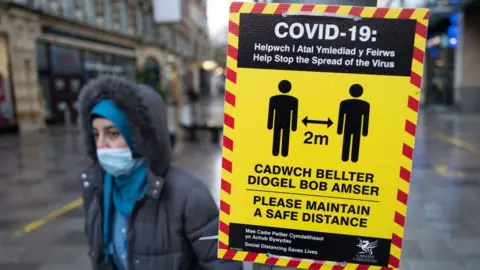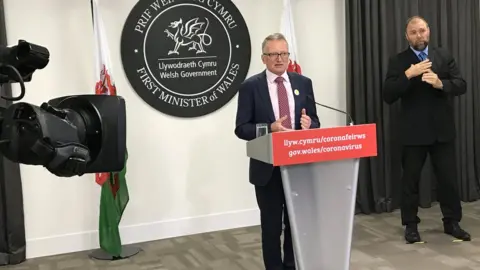Covid inquiry: Welsh government health chiefs face questions
 Getty Images
Getty ImagesSenior officials are giving evidence to the UK Covid inquiry about how well prepared Wales was for the pandemic.
Chief medical officer Sir Frank Atherton and former NHS Wales head Dr Andrew Goodall are being questioned on Monday afternoon.
Both men were key to Wales' Covid response, appearing regularly in live televised media briefings.
First Minister Mark Drakeford and the then Health Minister Vaughan Gething are due before the inquiry on Tuesday.
Mr Gething became economy minister in May 2021 while Dr Goodall is now the Welsh government's permanent secretary, its most senior civil servant.
The hearings, chaired by former judge and crossbench peer Baroness Hallett, have heard accusations from the Covid-19 Bereaved Families for Justice Cymru group that there was a "catastrophic failure" to plan for such an emergency by Welsh ministers.
Ahead of the hearing on Monday, group member Margaret Williams, whose mum died in a care home in April 2020, said she believed the Welsh government's lack of preparedness for a pandemic resulted in them acting "like headless chickens".
She told BBC Radio Wales' Breakfast programme: "It's a very significant week. I am hopeful that we get some answers from these people. We haven't had any up to now.
"I think as a government they had a duty of care and I think it was well within their remit to do a full plan.
"A lot of people died, my mum included, and I don't feel there was any preparation."
 Welsh Government
Welsh GovernmentGiving evidence on the first day of the inquiry last month, the group said the Welsh government "do not appear to have taken sufficient steps to understand and plan for the risks of a pandemic", despite UK-wide warnings.
The group's barrister, Kirsten Heaven, said this had led to "much more severe consequences from Covid-19 for vulnerable groups and communities".
The group also accused the Welsh government of trying to "shift responsibility" for pandemic planning on to the Senedd and civil service.
"Wales and the Welsh government did not have an adequate understanding of the risks posed to the people of Wales from the pandemic before and during the relevant period," Ms Heaven added.
"For example, pandemic preparedness failed to take account of the acute health inequalities in Wales, distinct from the rest of the UK, and that specifically included levels of chronic ill-health and disability in the older population."
Wales' pandemic preparedness is being considered as part of the UK-wide inquiry, with public hearings in Wales this autumn.
The Welsh government has rejected calls for a Wales-specific inquiry.
A cross-party Senedd committee has also been established to see if there were any gaps in what the UK inquiry reports about Wales.
If it finds gaps it will review those areas, providing Members of the Senedd agree, but it would not be the full public inquiry that campaigners want.
